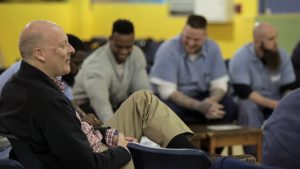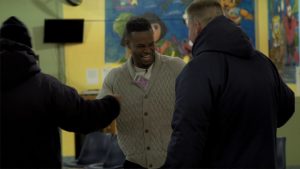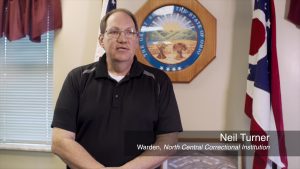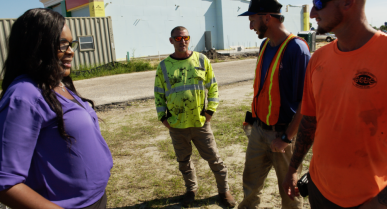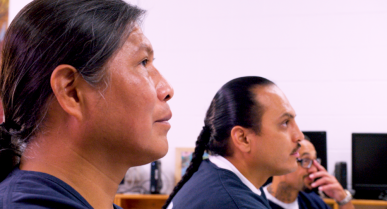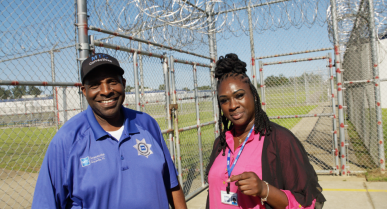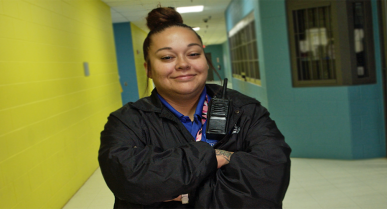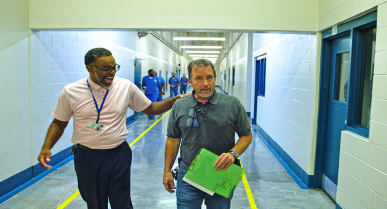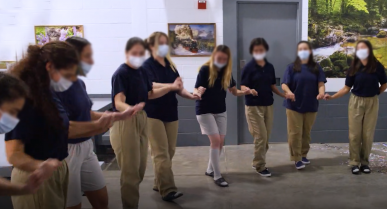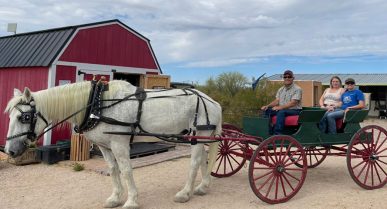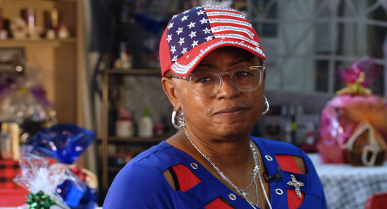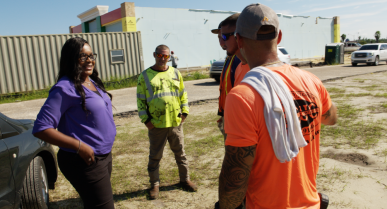“To see gang members…as friends, that’s a big impact”
Three year ago, a group of gang leaders at North Central Correctional Complex in Marion, Ohio were invited to a weekly program called Christian rap. Most corrections professionals said it was a bad idea to put these men together in one room. They said it would never work.
This is their story. Two offenders in the program explain how they felt when they first went to prison.
“When I got here, I was a hot mess. I was just torn up and broken. You know, I thought that coming here, it was over; that I’m another statistic; that there’s no hope and I was lost.”
“You get kind of, uh, angry because it feels like the whole world has shut you out. You don’t hear from your loved ones. You don’t receive Christmas cards, birthday cards. You call; no one answers your phone calls. And you start to think, no one cares.”
Warden Neil Turner says, “They see me on a daily basis. They see my staff on a daily basis. But they don’t have that outside connection, and so when they see somebody coming in, giving their time freely to try and allow them to have the opportunity to change their behavior, they can then model that behavior. Really, the heart of the program is somebody from the outside, somebody that’s a volunteer coming in and saying, ‘Look guys, there’s a better way to do things.”
The rap class is facilitated by volunteer Kent Money.
“I volunteer a lot. I’m up here two or three times a week anyway, so I thought if I’m going to come up here, I want to make an impact not only in individual lives but also the institution. I started the rap class about three years ago. And my role is just to bring guys in of influence of the yard and bring in some volunteers from the outside that I think would benefit the guys and basically have a family-style, sit-down dinner with the guys.”
One offender talks about what he first thought when the program began,
“To be honest, when he first showed up, we said, ‘Some old, white guy coming in here…what is his thing, what is his angle?’ Because to be honest, I thought it was some guy checking off some deed, some Christian deed he had to do, you know, some religious box for his church, look I go in a prison. But, how wrong I was—how wrong I was about him. He has helped me reconstruct my life.”
Mr. Money says the volunteers are crucial.
“Volunteers are the key to any institution, but this program in particular. And I bring in a variety of people. I call on Honda, and throughout my day at Honda I meet a lot of good people that are either volunteering or concerned about their community.”
Volunteer John Duffy comments,
“We go in there every Thursday, and we have a group setting where we sit around in a circle. It’s called our rap class. And so they sit around, and they listen to different inspirational music or talks. And then each member will talk about how that moved them, or how that impacted their life or what can they do to do things better.”
Volunteer James Dillard III says the volunteers are there to help in any way,
“We’ll listen to what’s going on in their day. How are they feeling? How can we serve them, and really just be there for them.”
Warden Turner adds, “The rap program itself is an unusual type program. A lot of the guys who are in the rap class are or were members of gangs on the street. They’re able to sit down and talk and create relationships with each other. And those relationships then spill out into the compound.”
One offender says what this program is doing to individual offenders is incredible,
“I’ve been in a lot of programs since I’ve been locked up, but this program is something different. To see gang members in the same program together, interacting as friends and showing love not just in the program but outside on the compound-that’s a big impact especially in prisons today.”
Facilitator Money adds, “The warden runs the prison one way, the captain runs a shift a certain way, but the guys in our class, they run the prison from their way.”
One offender comments, “Our goal is to make a difference on the yard, so within the class we pick and choose who comes to it, like people that we feel who have seniority or can make a difference.”
Another offender says, “These are guys, you need to understand that, that command at least 50 to 60 guys.”
One offender adds how having offenders of influence in the rap class helps motivate other offenders to turn their lives around and make better choices.
“When these younger guys see these older guys getting up here and talking, opening up and giving these testimonies, and they see us mingling—it branches out.”
The warden also see the positive impacts of this class on daily operations.
“You see it in the yard. When we have struggles sometimes, you see these guys who will go to each other and they’ll sit down and talk through the differences they have. And instead of having a fight, you have guys talking out their differences, so that’s a huge thing where in the past they would have resolved it with violence, and now they’re talking through it. Wardens in corrections environments have said for so long: to get this many guys from diverse gangs together, it doesn’t work. And that’s what they’ve been told. And when you’re told that your whole career, you tend to believe that. But if you’re willing to step out and take that chance, sometimes you get great benefits. And this program has been a great benefit.”
One offender has also seen great changes, “For us to come together and cut down on the violence on the yard or maybe in the gym. You know, if something pops off, it’s like I know this guy. He’s in the class with me. So it really has worked. And just knowing the volunteers that come in—the realness and the respect they have for us. The kindness and the love and the way that they go out of their way for us, it makes you almost obligated to put forth an effort to make a change.”
Another offender expresses gratitude for the volunteers.
“These men come in here with open minds and open hearts. They care about what we’re feeling, how our day is going, what ideas we have and just to talk to you as a human being; like we’re corresponding right now, it’s a different type of feel.”
Volunteer James Dillard III says,
“When I go in that prison and I see men from 19 to 30, I not only can see myself but my brother is also in that same age group. So when I look at that it almost strikes home.”
For volunteer John Duffy, success in any program begins by seeing incarcerated individuals as people.
“What the world portrays is behind those walls is a group of monsters. What it’s really been like; they’re human beings that look just like me and you who have made some mistakes; some small mistakes, some big mistakes, but they’re human beings. When we come in here and treat them just like, and we’re not judging them, it kind of gives them hope.”
“When you’re locked away from everything, the little things mean the most. And someone showing that they care for you—that means everything,” stresses one offender.
As part of the rap class, participants are treated to a meal.
And a lot of people think that they come just for the food, and initially that’s probably part true. We give them fried chicken every Thursday. And some of these guys haven’t eaten fried chicken in 20-25 years. But it becomes more than that,” says Kent Money.
“They’re getting an experience that allows them to see each other on a different level; to experience a communication and a fellowship they otherwise wouldn’t have had.”
For one offender, the class hold a special place in his heart.
“It’s like I’m sitting with my family; sitting there eating, having a good time. Everybody laughing, joking, talking to one another, listening to music. It just takes you away. It takes you away.”
“I think I realized this program was different when you start to hear all of the stories and testimonies of how being together has really changed them,” says volunteer James.
“I mean it’s changed my way of thinking. It’s changed my behavior. I was getting cold there for a while, and through the program I’ve opened up,” shares one offender.
Another adds, “It shows me, like, different ways that I can go about living my life now.”
Another talks about his troubled past,
“I was in a gang, but now I see that there is no good ending to being in a gang.”
“I’ve changed a lot. I know that sounds crazy, just that little class. But it’s not so much the class. I think it’s the environment,” adds one offender.
Warden Turner praises the work of the volunteers.
“These volunteers aren’t just people who donate an hour here or an hour there. They are the people that allow these guys to create a connection to somebody on the street. They allow that mentorship program to go on. And if you don’t that, you really have a hard road to go with running your prison.”
“There are 32 prisons in the state of Ohio,” says class facilitator Kent Money. “And they average probably about 2,500 men in each prison; 97 percent of them coming out. And they’re going to become your neighbors, so this is an opportunity to reach them while they’re here.”
Warden Turner echoes that thought, “If we don’t provide them with what a healthy relationship is, when they get out—and almost all of them are going to get out—how do we expect them to function in society in a healthy relationship?”
“If they don’t have anything positive to hold on to, they’re going to go back to what they know,” emphasizes volunteer John who then shares a very personal story.
“My nephew was murdered a year ago. And our nephew was our pride and joy. Through this prison ministry, I can honestly say that sitting around them, hearing their stories, I was able to forgive the gentleman that took my nephew’s life. Just the love and support from those brothers—it’s therapy for me. Every week, they always ask how I’m doing and how my family is doing.”
Warden Turner adds, “You watch TV and you watch the stereotypical offender, and it’s not always that guy. Inmates are people that made choices that aren’t always the best choices, but they want to have something that allows them to get better. The public needs to understand that these programs are vital for a good, safe and secure facility. And they’re vital for our communities. If we don’t do these kind of programs in here, then we’re only hurting ourselves when we release the offender.”
An emotional offender wraps up by saying,
“What do I want people to know about this from the outside? That just because we made a mistake, just because we got in here—that when people come in from the outside like John, James, and the other volunteers that come in—that it means a lot. Because now what you do is you instill that hope again, that it’s not over. That if you decide to do a few things, if you decide you want to go this way, there are people out here who are willing, if this is what you want to do. And this is just awesome to see. And if I want them to know anything—that we are redeemable. And that it’s a group of men in here right now that are on fire, and we’re ready, and we’re ready.”
About North Central Correctional Complex
North Central Correctional Complex is accredited by the American Correctional
Association—achieving over 99% compliance for both mandatory and non-mandatory
standards in its most recent audit. Other accreditations and certifications include the
Correctional Education Association and the Prison Rape Elimination Act (PREA).
